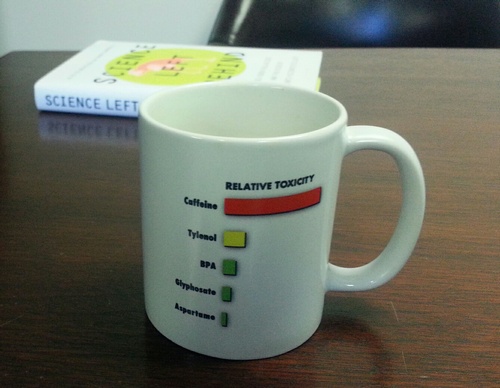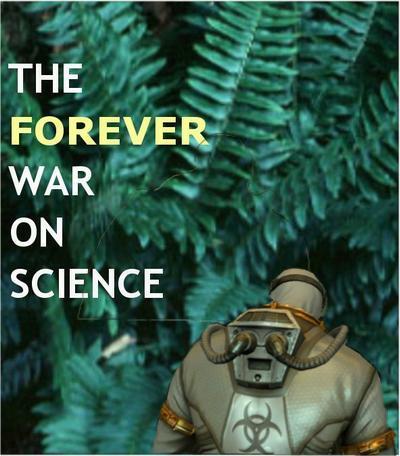Paracelsus famously noted that the dose makes the poison.
His wisdom has been accepted for centuries, from the least educated to the most. At least until about 25 years ago, when environmental activists decided that there is instead a u-shaped curve for chemicals (1) they wanted to raise money scaring people about. At high levels a chemical can be toxic, sure, toxicologists, biologists, and chemists all accept that, but at low levels they aren't, so to get around that activists began using proxies and suggesting correlation. (2) And then some modern academics are able to fool people while armed with gavage tubes and cell cultures and science terms that have a ring of truthiness; like that any "toxic chemical" can change hormones, no matter the concentration.
That hasn't worked very well for them and the reason the public remains unconvinced is the American Council on Science and Health. We have been debunking these kinds of junk science claims since 1978. While I write this, the coffee I am drinking has changed my hormones. It's detectable. And coffee is toxic. Have you seen the LD50 of caffeine? In rats, it's 10X as deadly as the weed killer glyphosate (3), which has activists and trial lawyers suing companies in California. (4) If you are selling fear and doubt, the presence of any pathogen is equal to pathology - if you can detect a drop in 160 Olympic-sized swimming pools full of water, and you can't say it is bad scientifically, you can instead claim that it "changes" the water.
If that sounds like homeopathy, they do share a lot in common.
And that is the credibility problem chemical activists like Pete Myers and Andreas Kortenkamp and Gilles-Eric Seralini and Christopher Portier face when trying to get attention for their beliefs; they have to say that Paracelsus is wrong. They have to throw out science and replace it with mysticism. Just like homeopaths do.
Since promoting the belief that any hormone change is bad hasn't worked they have instead been claiming that a "cocktail" of harmless chemicals is somehow doing something greater than the individual harmless chemicals can. Instead of water memory, the toxic cocktail myth claims that 5 or 10 or 100 different trace chemicals together "add up" to cause greater problems than if those same trace chemicals were given in sequence. To toxic cocktail believers, adding 100 things that are 0.000000001 all at once is going to give a different result than adding 0.000000001 in sequence 100 times. If they do it all at once, they claim, the harm is real whereas in sequence they concede the harm is not present.
They don't just deny chemistry, toxicology and biology. They deny simple arithmetic.
But denying arithmetic is what toxic cocktail activist Andreas Kortenkamp does in a new letter ("Perspectives" section) in Science, written with fellow environmental activist Michael Faust. What is their evidence for a toxic cocktail dooming us all? They don't provide any citation when they write "Scientific evidence for heightened toxicity from such mixtures is mounting" and editors at Science didn't ask awkward questions that real science journalists would have asked like, 'ummm, is this supposed evidence actually just crappy conspiracy papers in Environmental Health Perspectives and Endocrine Connections magazine?' Given that the letter had little editorial scrutiny, they were able to nonchalantly claim that while NOAELs (no observed adverse effect levels) may not show harm from trace chemicals, that is because other scientists - hundreds of thousands of other scientists in an overwhelming consensus - simply don't understand additive power. And government is in the pocket of Big Chemical and therefore doesn't demand they test all the possible combinations together.
There is a reason Kortenkamp is on the conspiracy side and science is opposed to him. Dose Addition works. That science is settled. His belief that trace chemicals in a "cocktail" cause endocrine disruption is not based on anything but ideological voodoo.
He has an advanced degree so he must understand the concept of hormones and binding affinity and that measures in urine say nothing at all about absorption. Yet he ignores those inconvenient truths that have debunked this scaremongering time and again in their recent op-ed.
How can the public easily know they are being duped by that kind of truthiness? When the claims don't pass the four word test for harm: Where are the bodies?
There are none. We are healthier than ever.
Still, they ignore that and go on to suggest that governments force companies to test every chemical in every possible combination with every other chemical, because by doing so they can insure no chemical is ever approved - unless it is a chemical in a natural product that they want exempted from scrutiny. The kinds of "natural" and "organic" products promoted by groups that fund Kortenkamp and Faust and Pete Myers.
Scaremongering does nothing to help the public. Science magazine is actually promoting public distrust in science by giving this warmed-over conspiracy theory a new air of legitimacy. Unfortunately this continues their recent pattern; they are regularly reprinting anti-science activist op-eds. AAAS, which publishes Science, is run by a politician, but that doesn't mean they should become overtly anti-science in the interest of shoring up their plummeting subscription memberships by appealing to the beliefs against science of one party.
We have been debunking toxic cocktail hype forever and endocrine disruption hype since 1999. You can even read our first book on it for free here. Thanks to all you readers and donors for continuing to make it possible.
NOTES:
(1) A u-shaped curve means that a chemical will have a response that varies from high to low to high as concentration increases. It defies the principles of modern pharmacology. Philip Landrigan, epidemiologist and pediatrician, is the go-to guy for the New York Times when they claim this sort of thing.
(2) Yes, they are suing over coffee also, California is a good state for anti-science beliefs because they abdicated their regulatory system to activist epidemiologists in France.
(3) It's even on our coffee mugs.

(4) An actual paper claimed living near farms caused autism - because pesticides. The authors did not actually test for any pesticides in anyone, they instead created a proxy. They took California pesticide applications and matched them to autism diagnoses to create a correlation.
Basically, proxies can do anything if someone wants to do advocacy rather than science. All you need is a small sample size and willingness to accept inconsistent data, like that near and far applications of pesticides caused harm but in the middle made no difference - a u-shaped curve for autism. Which principal investigator Irva Hertz-Picciotto of U.C. Davis readily did. Without disclosing her two conflicts of interest, which were leadership in an autism group and an anti-chemical group.




